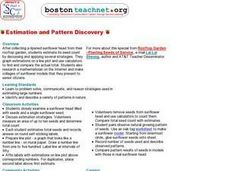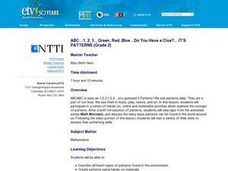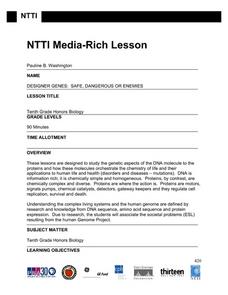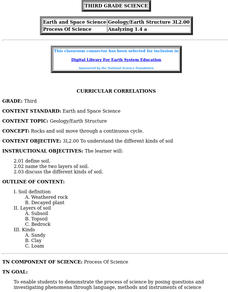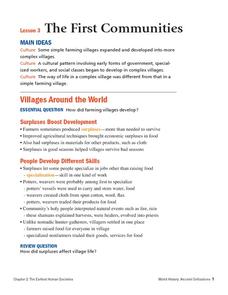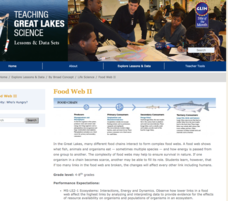Curated OER
Populations in the Path of Natural Hazards
Learners read "Geographical Mobility: 1995-2000." They examine the maps in the handouts and compare them with maps from an atlas. In the second part of this instructional activity, students read "In Harm's Way." They receive three more...
Curated OER
It's All in the Rings
Students examine how the environment influences tree growth. In this tree instructional activity, students analyze the growth of rings to see how plants adjust to adverse conditions in order to survive.
Curated OER
Science: Entomology in Action
Learners discover how coroners use insect life cycles to estimate the time of death in cases. they describe how forensic entomologists combine environmental factors with insect life cycles to note the changes. Students examine an...
Curated OER
From Caterpiller to Butterfly: Cycles, Circles, and Patterns
Students examine art of butterflies and discuss what they know about the insect. They create their own butterfly puppets and write a story to represent its life cycle.
Curated OER
Estimation and Pattern Discovery
Students collect sunflower heads from their community garden. They estimate its seed count using different strategies. They graph their estimations on a graph and use calculators to find the actual total.
Curated OER
Comparing Seeds
Students explore the process of growing plants from seeds. In this hands-on science experiment, students observe different seeds (store bought vs. those directly from food items) and predict growing patterns.
Virginia Department of Education
Succession
The final lesson in a two-part series prompts scholars to create newspaper articles and succession events. Applying their knowledge of the ecosystem and the past examples of succession, they predict what will happen in the future using...
Curated OER
The Poinsettia: Native Mexican Plant vs. U.S. Christmas
Students compare and contrast native Mexican poinsettia plants to those marketed in the United States. They watch a PowerPoint presentation, and listen to a version of the legend of the poinsettia. Students then create a paper pinwheel...
Curated OER
Two Rivers Ran Through It
Sixth graders discover the problems that early Mesototamian farmers faced while developing agriculture in the land between the Tigris and Euphrates Rivers. They design a working model that solves those unique challenges.
Curated OER
Dream! (Part One)
Young scholars share with the class what they want to be when they grow up. As a class, they identify what they want to be for Halloween as well. They are videotaped stating their dream and photographed with their mask. Using the masks,...
Curated OER
Comparing and Contrasting
Students practice compare and contrast skills. In this science and language development lesson, students complete a T chart generating traits of a snail and a clam. Students complete a related worksheet.
Curated OER
Water and the Earth
In this water and Earth activity, students read a 2 page article on water and the Earth, name the clouds in 2 pictures and then list 4 sources of water in nature.
Mathematics Vision Project
Module 6: Quadratic Functions
Linear, exponential, now it's time for quadratic patterns! Learners build on their skills of modeling patterns by analyzing situations with quadratic functions. The sixth module in the Algebra I series has pupils analyze multiple...
Illustrative Mathematics
The Djinni’s Offer
The djinni in this resource offers gold coins. Learners use the properties of exponents to make their decision as one offer increases exponentially. This makes a great group project. As the commentary suggests, start by having groups...
Curated OER
ABC...1, 2, 3...Green, Red, Blue...Do You Have a Clue?... IT'S PATTERNS
Second graders view clips from the animated series Math Monsters, and discuss the many ways patterns can be found in the world around us. Following the video portion of the lesson, 2nd graders visit a variety of Web sites to assess their...
Curated OER
Germs and Your Body
Students study germs and ways your body fights against disease. In this germs lesson students complete an activity that demonstrates where germs can get into your body.
Science-Class.net
Rock Candy Crystals
Candy is one of my favorite words, and it's an even better word when it relates to science. Yes, candy science can happen when you grow rock candy crystals with your class. The entire process for growing these edible wonders of nature is...
Curated OER
Temperature and the Tomato
You will need a photovoltaic system and monitor at your school in order to obtain all of the data required to thoroughly implement this instructional activity. Your class monitors daily temperature and insolation amounts over a two week...
Curated OER
Graphing the Population Explosion of Weeds
Students are introduced to the seed cycle and draw the specific steps. In groups, they identify the human barriers to the spreading of weeds. After calculating the rate of spreading of the Yellowstar Thistle, they create graphs to see a...
Curated OER
Curricular Correlations
An interesting lesson on different types of soils is here for you. In it, learners discuss what soil is, and consider three piles of soil - clay, sand, and loam. During the rest of the lesson, third graders discover all sorts of...
Curated OER
Paper Coil Baskets
Have your class learn about basket making with this resource. Learners talk about the techniques used to make baskets in Native American cultures. Then, they make baskets using paper coils. The results are attractive.
Houghton Mifflin Harcourt
The First Communities
These documents list essential questions and foundational concepts associated with early civilizations and farming communities in the agricultural revolution. Use this as a starting point for developing specific lessons and activities...
Michigan Sea Grant
Food Web II
A food web consists of complex food chains and the more complex the web, the better likelihood of survival. Learners compare and contrast food webs and food chains and discuss concepts like the predator-prey and consumer-producer...
Curated OER
How Trees Contribute to the Water Cycle
In this water cycle instructional activity, 3rd graders conduct an experiment where they observe and calculate how water transpires in different types of trees. Students engage in a class discussion and use Venn Diagrams to compare...






